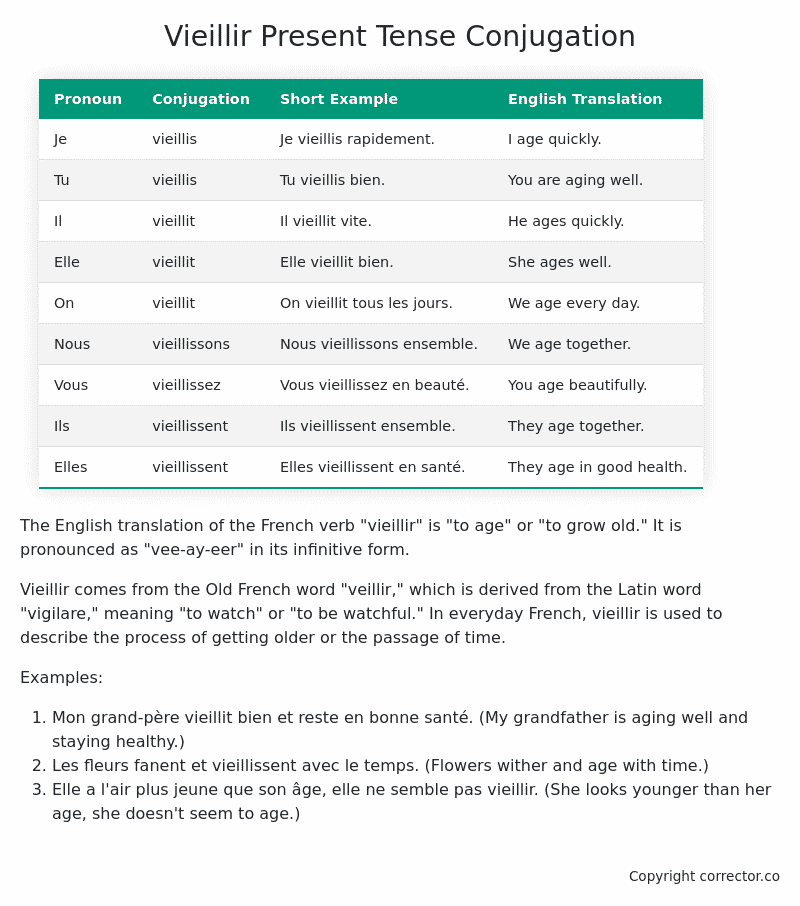Le Present (Present Tense) Conjugation of the French Verb vieillir
Introduction to the verb vieillir
The English translation of the French verb “vieillir” is “to age” or “to grow old.” It is pronounced as “vee-ay-eer” in its infinitive form.
Vieillir comes from the Old French word “veillir,” which is derived from the Latin word “vigilare,” meaning “to watch” or “to be watchful.” In everyday French, vieillir is used to describe the process of getting older or the passage of time.
Examples:
- Mon grand-père vieillit bien et reste en bonne santé. (My grandfather is aging well and staying healthy.)
- Les fleurs fanent et vieillissent avec le temps. (Flowers wither and age with time.)
- Elle a l’air plus jeune que son âge, elle ne semble pas vieillir. (She looks younger than her age, she doesn’t seem to age.)
Vieillir – About the French Present Tense
To take a deep dive into all the French tenses then see our article on Mastering French Tense Conjugation.
Common Everyday Usage Patterns For Le Present
Interactions with Other Tenses
Table of the Present Tense Conjugation of vieillir
| Pronoun | Conjugation | Short Example | English Translation |
|---|---|---|---|
| Je | vieillis | Je vieillis rapidement. | I age quickly. |
| Tu | vieillis | Tu vieillis bien. | You are aging well. |
| Il | vieillit | Il vieillit vite. | He ages quickly. |
| Elle | vieillit | Elle vieillit bien. | She ages well. |
| On | vieillit | On vieillit tous les jours. | We age every day. |
| Nous | vieillissons | Nous vieillissons ensemble. | We age together. |
| Vous | vieillissez | Vous vieillissez en beauté. | You age beautifully. |
| Ils | vieillissent | Ils vieillissent ensemble. | They age together. |
| Elles | vieillissent | Elles vieillissent en santé. | They age in good health. |
Other Conjugations for Vieillir.
Le Present (Present Tense) Conjugation of the French Verb vieillir (this article)
Imparfait (Imperfect) Tense Conjugation of the French Verb vieillir
Passé Simple (Simple Past) Tense Conjugation of the French Verb vieillir
Passé Composé (Present Perfect) Tense Conjugation of the French Verb vieillir
Futur Simple (Simple Future) Tense Conjugation of the French Verb vieillir
Futur Proche (Near Future) Tense Conjugation of the French Verb vieillir
Plus-que-parfait (Pluperfect) Tense Conjugation of the French Verb vieillir
Passé Antérieur (Past Anterior) Tense Conjugation of the French Verb vieillir
Futur Antérieur (Future Anterior) Tense Conjugation of the French Verb vieillir
Subjonctif Présent (Subjunctive Present) Tense Conjugation of the French Verb vieillir
Subjonctif Passé (Subjunctive Past) Tense Conjugation of the French Verb vieillir
Subjonctif Imparfait (Subjunctive Imperfect) Tense Conjugation of the French Verb vieillir
Subjonctif Plus-que-parfait (Subjunctive Pluperfect) Tense Conjugation of the French Verb vieillir
Conditionnel Présent (Conditional Present) Tense Conjugation of the French Verb vieillir
Conditionnel Passé (Conditional Past) Tense Conjugation of the French Verb vieillir
L’impératif Présent (Imperative Present) Tense Conjugation of the French Verb vieillir
L’infinitif Présent (Infinitive Present) Tense Conjugation of the French Verb vieillir
Struggling with French verbs or the language in general? Why not use our free French Grammar Checker – no registration required!
Get a FREE Download Study Sheet of this Conjugation 🔥
Simply right click the image below, click “save image” and get your free reference for the vieillir Present Tense tense conjugation!

I hope you enjoyed this article on the verb vieillir. Still in a learning mood? Check out another TOTALLY random French verb present conjugation!


